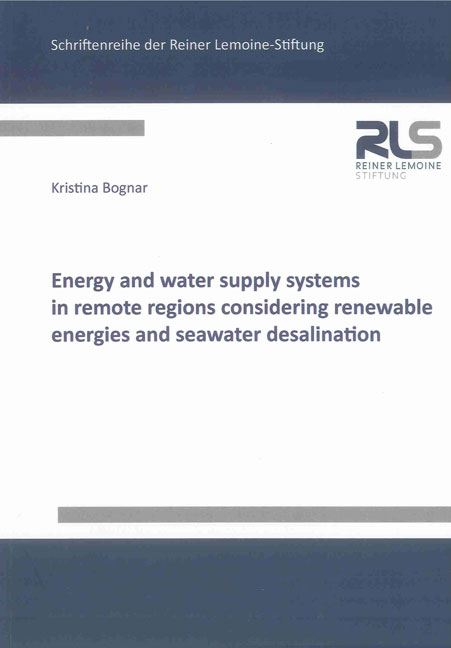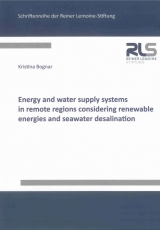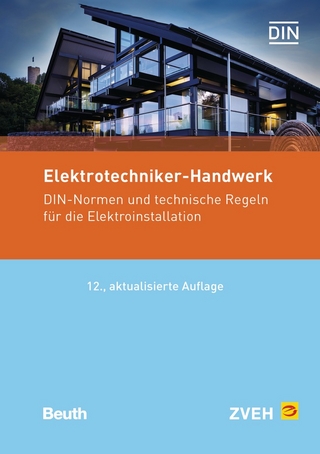Energy and water supply systems in remote regions considering renewable energies and seawater desalination
Seiten
2013
|
1., Aufl.
Shaker (Verlag)
978-3-8440-1933-9 (ISBN)
Shaker (Verlag)
978-3-8440-1933-9 (ISBN)
- Keine Verlagsinformationen verfügbar
- Artikel merken
Islands and remote regions often depend on the import of fossil fuels for power generation. Due to the combined effect of high oil prices and transportation costs, energy supply systems based on renewable energies are already able to compete with fossil-fuel based supply systems successfully. A limiting factor for development in arid regions is the fresh water scarcity resulting from low natural water stocks and excessive groundwater usage.
How seawater desalination and remote island-grids with a high share of renewable energies can benefit each other, is still not sufficiently investigated. To answer this and related research questions, a model for optimizing self-sufficient energy and water supply systems has been developed, using the modeling language GAMS. Based on sets of hourly data various scenarios implementing energy conversion technologies, energy storage systems and desalination processes have been simulated and technoeconomic optimizations accomplished. A global sensitivity and real option analysis addresses optimal system designs and finance strategies taking uncertain demand and price developments into consideration.
Key findings reflect that the integration of renewable energies is beneficial. On the Cape Verde island Brava, that has been chosen as a case study in the framework of this research, power is currently provided by diesel generators at prices of 0.25 to 0.31 €/kWh and water is sold for 2.35 and 4.93 €/m3 depending on the quantity. With the recommended wind-battery-diesel and desalination supply system specific electricity costs ranging from 0.15 to 0.21 €/kWh and water costs of 1.53 €/m3 are achievable.
Effects of integrating desalination as a dynamic load complementing consumer induced load curves in stochastically fluctuating energy systems are analyzed as well as the respective benefits highlighted: Excess wind energy, fuel consumption, and required energy storage capacities can be minimized resulting in lower specific electricity costs. From five thermally and electrically driven desalination processes a variable operating reverse osmosis unit is the most flexible process facing intermittent and part-load operation.
To determine the technological and economic robustness of such an energy and water supply system the most sensitive parameters are identified and various analyses performed. The approaches that have been introduced and respectively the results derived for the Cape Verde island Brava have been further underlined by investigating comparable island-grids and are transferable to a global perspective.
How seawater desalination and remote island-grids with a high share of renewable energies can benefit each other, is still not sufficiently investigated. To answer this and related research questions, a model for optimizing self-sufficient energy and water supply systems has been developed, using the modeling language GAMS. Based on sets of hourly data various scenarios implementing energy conversion technologies, energy storage systems and desalination processes have been simulated and technoeconomic optimizations accomplished. A global sensitivity and real option analysis addresses optimal system designs and finance strategies taking uncertain demand and price developments into consideration.
Key findings reflect that the integration of renewable energies is beneficial. On the Cape Verde island Brava, that has been chosen as a case study in the framework of this research, power is currently provided by diesel generators at prices of 0.25 to 0.31 €/kWh and water is sold for 2.35 and 4.93 €/m3 depending on the quantity. With the recommended wind-battery-diesel and desalination supply system specific electricity costs ranging from 0.15 to 0.21 €/kWh and water costs of 1.53 €/m3 are achievable.
Effects of integrating desalination as a dynamic load complementing consumer induced load curves in stochastically fluctuating energy systems are analyzed as well as the respective benefits highlighted: Excess wind energy, fuel consumption, and required energy storage capacities can be minimized resulting in lower specific electricity costs. From five thermally and electrically driven desalination processes a variable operating reverse osmosis unit is the most flexible process facing intermittent and part-load operation.
To determine the technological and economic robustness of such an energy and water supply system the most sensitive parameters are identified and various analyses performed. The approaches that have been introduced and respectively the results derived for the Cape Verde island Brava have been further underlined by investigating comparable island-grids and are transferable to a global perspective.
| Erscheint lt. Verlag | 3.6.2013 |
|---|---|
| Reihe/Serie | Schriftenreihe der Reiner Lemoine-Stiftung |
| Sprache | englisch |
| Maße | 148 x 210 mm |
| Gewicht | 285 g |
| Einbandart | Paperback |
| Themenwelt | Technik ► Elektrotechnik / Energietechnik |
| Schlagworte | Energietechnik • Ingenieurwissenschaften • Reiner Lemoine-Stiftung |
| ISBN-10 | 3-8440-1933-2 / 3844019332 |
| ISBN-13 | 978-3-8440-1933-9 / 9783844019339 |
| Zustand | Neuware |
| Haben Sie eine Frage zum Produkt? |
Mehr entdecken
aus dem Bereich
aus dem Bereich
DIN-Normen und Technische Regeln für die Elektroinstallation
Buch | Softcover (2023)
Beuth (Verlag)
86,00 €
Kolbenmaschinen - Strömungsmaschinen - Kraftwerke
Buch | Hardcover (2023)
Hanser (Verlag)
49,99 €




